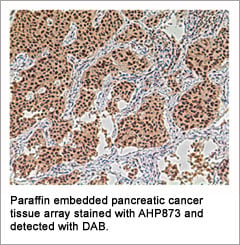Aurora A Kinase Antibodies
- Useful in a wide range of applications
- Suitable for formalin-fixed paraffin-embedded tissue sections
- Choice of formats
-
Performance guarantee
| Specificity | Target Species | Host Species | Clone | Format | Pack Size | Applications | Product Code |
|---|---|---|---|---|---|---|---|
| AURORA-A KINASE | Human | Mouse | 35C1 | Purified | 0.1 mg | IF, IP, WB | MCA2249 |
| AURORA-A KINASE | Human | Rabbit | Purified | 100 µl | WB | VPA00851 |
Role of Aurora A Kinase
 Cell cycle progression through mitosis and meiosis involves regulation by serine/threonine kinases from the Aurora family. A key member of the Aurora family is Aurora A Kinase (Aurora 2, murine serine/threonine Kinase 6 (STK6), human serine/threonine Kinase 15 (STK15)).
Cell cycle progression through mitosis and meiosis involves regulation by serine/threonine kinases from the Aurora family. A key member of the Aurora family is Aurora A Kinase (Aurora 2, murine serine/threonine Kinase 6 (STK6), human serine/threonine Kinase 15 (STK15)).
During interphase, Aurora A Kinase localises to the centrosome, which organizes microtubule assembly into a mitotic spindle. Aurora A Kinase regulates mitotic spindle assembly and stabilization through the recruitment of different proteins including Kinesin 5 and TACC 3 (2).
Aurora A Kinase expression is regulated by the tumor suppressor protein p53, which is found at the centrosome during mitosis. p53 binds and inhibits Aurora A Kinase activity. Choose from our selection of quality p53 Antibodies.
Aurora A Kinase also acts as an oncogene as it has been shown to transform cells in vitro. The role of Aurora A Kinase in cancer is thought to be due to its dysregulation. This leads to cells unable to complete mitosis, resulting in aneuploid cells, which are a trait of many tumors. As Aurora A Kinase is over-expressed in many tumors, including breast, colon, leukemia, ovarian and prostate, it is now a target for cancer therapy.
Current research in the pharmaceutical industry includes the development of Aurora A Kinase inhibitors as novel cancer treatments, some of which are already in clinical trials. Our cell biology range has a selection of quality products dedicated to Oncoprotein and Tumour Suppressor Protein Research.
Our versatile range of Aurora A Kinase antibodies
Our Aurora A Kinase Antibodies are suitable for immunohistochemistry of frozen tissue sections, immunofluorescence, immunoprecipitation and Western blotting. MCA2249 (Clone 35C1) is available in a choice of purified and biotin formats and also cross-reacts with mouse. It specifically recognizes an epitope within the non-catalytic N-terminal domain of Aurora A Kinase and does not inhibit Aurora A Kinase activity. These quality antibodies are part of our extensive Cell Cycle Associated Reagents from our cell biology range.
References
- Fu J. et al. (2007). Mol. Cancer Res. 5: 1-10.
- LeRoy P.J. et al. (2007). Cancer Res. 67: 5362-70.
- Chen, S.S. et al. (2002). Embo J. 21: 4491–4499.
- Bischoff, J.R. et al. (1998). Embo J8. 17: 3052–3065.
- Hoar K. et al. (2007). Mol. Cell Biol. 27: 4513-25.
- Ikezoe T. et al. (2007). Mol. Cancer Ther. 6: 1851-7.
- Carvajal R.D. et al. (2006). Clin. Cancer Res. 12:6869-75.
- Cremet, J. Y. et al. (2003). Molecular and Cellular Biochemistry 243: 123 - 131



